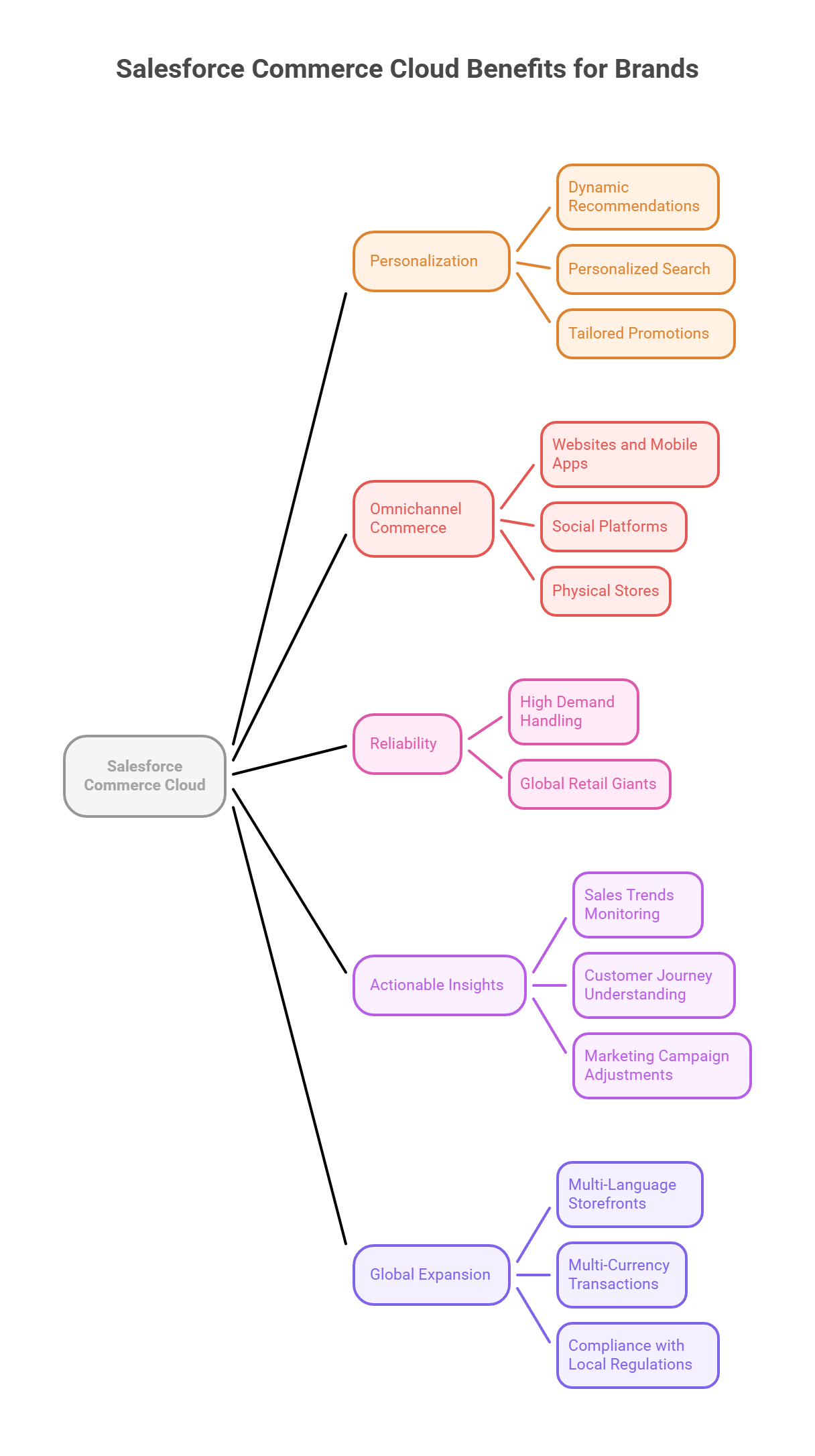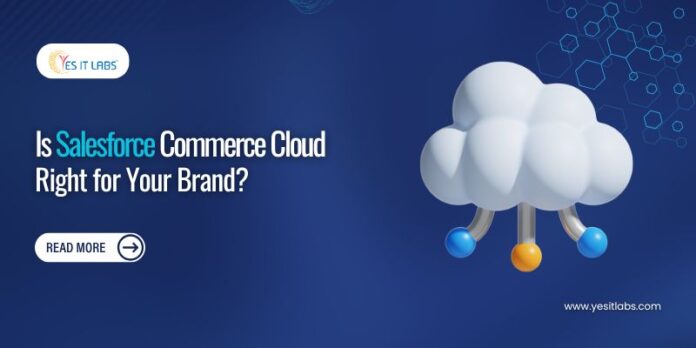In today’s competitive digital marketplace, selecting the right eCommerce platform is no longer just a technical decision. It directly impacts customer experience, operational efficiency, and long-term growth. Among the many solutions available, Salesforce Commerce Cloud (SFCC) stands out as an enterprise-level platform trusted by leading global brands.
But is it the right choice for your brand? Let’s dive deep into what Salesforce Commerce Cloud offers, its benefits and challenges, how it compares with alternatives, and the type of businesses that gain the most value from it.
What Is Salesforce Commerce Cloud?
Salesforce Commerce Cloud is a cloud-based, enterprise-grade eCommerce solution that helps brands unify customer experiences across web, mobile, social, and physical stores. Unlike smaller platforms, it goes beyond just running an online shop. It enables personalized engagement, omnichannel sales, and AI-driven insights.
Core Features of Salesforce Commerce Cloud:
- Omnichannel capabilities: Connect physical and digital sales for a unified experience.
- Personalized experiences: Leverage Salesforce Einstein AI for smart recommendations.
- Global commerce support: Multi-language, multi-currency, and region-specific tax compliance.
- Scalability: Handle peak traffic like seasonal sales without downtime.
- Native integration: Works seamlessly with Salesforce Marketing Cloud, Service Cloud, and CRM.
- Mobile-first design: Optimized for today’s mobile shoppers.
For many enterprises, partnering with a Salesforce development company is key to unlocking the full potential of this platform, ensuring smooth implementation, customization, and ongoing optimization.
Why Do Brands Choose Salesforce Commerce Cloud?
Here are the top reasons businesses adopt SFCC:

1. Personalization That Drives Conversions
Customers no longer want generic shopping experiences. They expect brands to anticipate their needs. Salesforce Einstein, the AI backbone of SFCC, powers features like:
- Dynamic product recommendations.
- Personalized search results.
- Tailored promotions.
Studies show personalization can improve conversion rates by 20–30 percent and significantly boost repeat purchases.
2. Omnichannel Commerce for Today’s Buyers
Modern consumers switch between devices and channels effortlessly. Salesforce Commerce Cloud helps businesses deliver consistent experiences across:
- Websites and mobile apps.
- Social platforms like Instagram and Facebook.
- Physical stores, enabling buy-online-pickup-in-store (BOPIS) or curbside pickup.
This omnichannel approach increases customer satisfaction and retention.
3. Reliability During High Demand
Seasonal promotions, flash sales, or viral campaigns can cause unexpected traffic surges. Salesforce Commerce Cloud is designed for scale, processing millions of transactions daily without affecting performance. This reliability makes it a preferred choice for global retail giants.
4. Actionable Insights From Data
With built-in reporting and advanced analytics, SFCC empowers businesses to:
- Monitor sales trends in real time.
- Understand customer journeys.
- Adjust marketing campaigns quickly.
When combined with Salesforce CRM, businesses gain a complete 360-degree view of their customers.
5. Global Expansion Made Easy
For brands looking to grow internationally, Salesforce Commerce Cloud offers:
- Multi-language storefronts.
- Multi-currency transactions.
- Compliance with local tax rules and regulations.
This allows businesses to scale globally without re-building systems from scratch.


Challenges and Drawbacks of Salesforce Commerce Cloud
While Salesforce Commerce Cloud offers unmatched enterprise capabilities, it may not be suitable for every business.
1. High Cost
The revenue-share model means Salesforce charges a percentage of your Gross Merchandise Value (GMV). For smaller businesses, this can feel expensive compared to subscription-based platforms.
2. Complexity
SFCC is designed for enterprises, which makes it feature-rich but also complex. Businesses often need certified developers or consultants for setup and management.
3. Customization Boundaries
Although highly extensible, SFCC has certain limitations compared to open-source platforms like Magento or WooCommerce.
Smaller businesses, especially those focused on budget-friendly solutions, might prefer to hire WooCommerce developers who can provide more cost-effective and flexible store-building options.
Salesforce Commerce Cloud vs. Competitors
How does SFCC compare to other popular eCommerce platforms?
|
Feature |
Salesforce Commerce Cloud | Shopify Plus |
Magento (Adobe Commerce) |
| Best For | Mid-to-large enterprises | Fast-scaling D2C brands | Highly customizable stores |
| Pricing Model | Revenue share (GMV-based) | Subscription + fees | Licensing + hosting costs |
| AI & Personalization | Built-in with Einstein | Add-ons required | Extensions required |
| Global Capabilities | Enterprise-ready | Moderate | Strong but manual setup |
| Integration | Deep Salesforce ecosystem | Large app marketplace | Custom APIs available |
| Ease of Use | Steep learning curve | Beginner-friendly | Requires developers |
Key takeaway: Salesforce Commerce Cloud is ideal for enterprises aiming for global scale and deep personalization. Shopify Plus suits fast-growing direct-to-consumer brands, while Magento is best for businesses seeking ultimate flexibility and customization.
Industry Insights and Market Data
- Global eCommerce sales are projected to surpass 8.1 trillion USD by 2026. Platforms like SFCC enable brands to capture a larger slice of this growth.
- 91 percent of retailers with omnichannel strategies achieve higher year-over-year customer retention compared to those without.
- Brands using AI-driven personalization report up to 30 percent increases in sales and engagement.
These insights show why global leaders in retail, fashion, and consumer goods continue to invest heavily in Salesforce Commerce Cloud.
Is Salesforce Commerce Cloud Right for Your Brand?
Ask yourself the following:
- Do you process high transaction volumes regularly?
- Do you need to unify in-store, mobile, and online experiences?
- Is personalization a top priority for your growth strategy?
- Do you already use other Salesforce solutions like Marketing Cloud or CRM?
If most answers are yes, Salesforce Commerce Cloud is likely the right platform.
However, if cost or technical complexity are concerns, consider alternatives such as Shopify Plus or WooCommerce. And if your needs extend beyond eCommerce into broader enterprise technology, partnering with a custom software development company in USA can help integrate SFCC into your overall digital strategy.
Final Thoughts
Salesforce Commerce Cloud is far more than an eCommerce platform. It is a customer experience powerhouse that blends AI personalization, omnichannel commerce, global scalability, and seamless integration into one robust system.
Yes, it comes with higher costs and complexity, but for enterprises looking to scale globally, enhance customer engagement, and future-proof their digital presence, the investment pays off.
Bottom line: If your brand is aiming for enterprise-level transformation and wants to deliver world-class digital shopping journeys, Salesforce Commerce Cloud is not just a good option, it may be the perfect choice.
FAQs
1. What type of businesses benefit most from Salesforce Commerce Cloud?
Mid-to-large enterprises, especially in retail, fashion, consumer goods, and global brands, see the greatest benefits.
2. Is SFCC affordable for small businesses?
Not always. Smaller companies may find platforms like Shopify or WooCommerce more cost-effective.
3. Does Salesforce Commerce Cloud support international selling?
Yes. It supports multiple currencies, languages, and tax systems for international markets.
4. How does it improve customer experience?
Through AI personalization, seamless omnichannel shopping, and unified data insights, customers receive tailored, consistent experiences.
5. Can Salesforce Commerce Cloud integrate with other tools?
Absolutely. Its strongest advantage is deep integration with Salesforce’s ecosystem, including CRM and Marketing Cloud.

